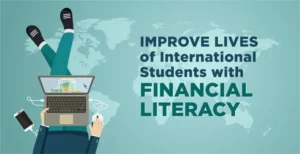The Finances and Financial Planning Concerning Nepali Students Studying in other Countries
Overseas education is a wonderful experience which opens many doors for learning and self development. However, one of the most important parts of this process is the financial one or the aspect of money management. Managing your finances as an international student is easier when you plan well ahead thus the need to plan right. Here are some important tips and strategies that will help you as a Nepali student pursuing higher education overseas to manage your money wisely.

Understanding the Costs
So it is imperative that you familiarize yourself with the several expenses that are involved when studying in another country. These can be broadly categorized into the following:
Tuition Fees: This is the largest cost and is an unpredictable one as it depends on the country, university or the program chosen by the candidate. One should make it a practice to search as well as compare different institutions’ tuition fees to make the right choice.
Living Expenses: These comprise of accommodation, feeding, transport, power and other sundry expenses. The price levels can be rather different even for similar neighborhoods that are situated in different cities or countries. It is a fact well understood by many that living within the urban centre is somewhat costly as compared to the rural regions.
Travel Expenses: This consists of the amount spent on tickets for travels to and from the study country and within the country of study.
Health Insurance: Others ensure that international students have health insurance as a rule since many nations demand it. Insurance costs differ and this depends on other factors and it is advisable to research the suitable insurance plans that fixes your needs as well as your pocket.
Miscellaneous Expenses: These may cover the cost of books, notes, other study materials, games, and many other expenses that are not simple to predict.

Creating a Budget
After you have determined the cost, the next step is to develop a large number of works based on the large general cost. A budget assists you in monitoring the amount of earnings and the amount spent, hence one does not spend beyond his/her allowance. Here’s how you can create an effective budget.
Here’s how you can create an effective budget:
Calculate Your Income: All sources of income must be listed these include scholarships, financial aid, wages from working, and any money from home. It would also be wiser to have realistic goals in relation to the amount that could likely be derived from each source.
List Your Expenses: There are essential and non-essential expenses – make sure to differentiate between them: tuition is an essential; food, gas money, night-outs are non-essential.
Track Your Spending: There is always the need to track your expenses through the use of budget apps, or simple excel sheets. Finally, always ensure you check your financial plan to see whether you are meeting the general obligatory standards and improve it if you have to .
Set Financial Goals: Let’s define your spending objectives including the short term ones, i.e. placing on a holiday, purchasing for a brand-new laptop, or the long term ones, i.e. repaying your student loans. One strategy for keeping to your practiced budget is to have definite aims in your activity.
Therefore, mastering personal finance for students means being able to save money.
Reducing expenses is one of the most effective strategies to relieve the application of the substantial financial pressure towards studying abroad. Here are some tips to help you save:
Choose Affordable Accommodation: Some of these are using apartments that can be shared, dormitories, or even living with a host family which may be cheaper than getting an apartment.
Cook at Home: People regard eating out as a pleasure that is why consuming prepared food often can be costly. Stated, cooking at home can be the best way to ensure that you are able to cut down your spending on foods and still be in a position to have a healthy diet. Prepare your meals in advance so that you do not have to order from restaurants ever so often to avoid the bill hitting the roof.
Use Student Discounts: Being a student should be taken advantage of when shopping for means of transport, clothes and any other items that has an offer for students. Notably, always ensure to carry a student ID while also inquiring about discounts from everywhere you are at.
Buy Second-Hand: Buy second-hand text books, furniture and other equipment cheaper as compared to new ones. Search on online selling sites, second-hand shops, and student change wikis.
Limit Non-Essential Spending: You should carefully think about what you spend your money in areas such as going out to eat, going to the movies, and shopping. Look for available cheap or no charge fun activities, as a way of passing time.

Earning While Studying
The international students are known to spend the most of their time studying, but most of them work to earn an extra dime. Here are some things to consider if you plan to work while studying:Here are some things to consider if you plan to work while studying:
Check Visa Regulations: Always comprehend the employment laws concerning your student visa in the country you intend to study. Some countries place so many limits on the number of hours that one can work.
Find Campus Jobs: Colleges must be your final destination as they provide many job openings like in the university library, canteen or at the office. These jobs are easy to come by because they are near your classes and are often unpaid or part-time.
Explore Internships: Suggest that you try to find internships that are associated with what you want to major in. Internships help gain working experience and sometimes pay the intern a stipend.
Freelance or Online Jobs: Think of freelance jobs or online jobs that you can do from any location. It could be teaching, essay writing, designing, or even advertising on the Internet.
Financial Aid and Scholarships
Applying for funds/grants and having scholarships also helps to minimize on the costs for studying in a foreign country considerably. Here are some steps to explore these options:Here are some steps to explore these options:
Research Scholarships: There are universities, governmental, private and non-governmental scholarships that should be searched for. Numerous scholarships exist for international students from Nepal where they can apply to get scholarships to study abroad.
Apply Early: The scholarship application process typically has an early due date. To boost your chances of landing the grant, begin your search and application in the early precedents.
Prepare Strong Applications: Be as articulate as possible in your essays, collect good letters of recommendation, and keep your academic standing in a good shape. The efficient preparation of an application can go a long way.
Seek Financial Aid: While considering going to college, and therefore financing the college education, one should not restrict him or herself with scholarships only, but apply for the grants, loans or work-study programs provided by colleges and governments.
Conclusion
Financial management is important for Nepali students who are studying in other countries since they know that budgeting is significant. Thus, knowing about all your expenses, making a detailed list of all the necessary expenditures, saving money, working while studying, and applying for the scholarships you can successfully manage your finances and use your international educational experience to the utmost. Here at Asian Education, we stand by you from the time you decide to study abroad till the time you achieve a prosperous financial career.



